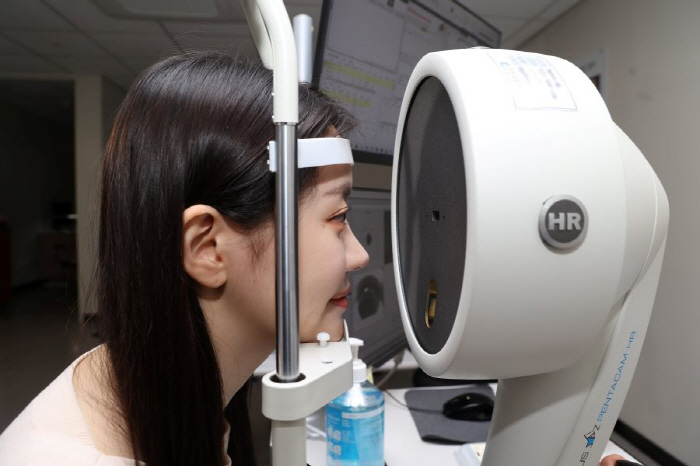Can I get my vision corrected even if I'm alive?
Aug 26, 2025
Looking in different directions without straightening the eyes can affect vision and binocular function beyond cosmetic problems. Diagnosis and treatment are high in children and adolescents, and if you have a history of strabismus, you may wonder if it is okay to have vision correction surgery after you become an adult.
The perspective is divided into 'endarsightedness' if the gaze is turned toward the nose without the alignment of the two eyes, 'endarsightedness' if it is toward the ear, and 'vertical lightness' if it is turned up or down. Depending on the time of occurrence, it is divided into pediatric and adult cases, and if the symptoms are not improved by non-surgical treatment such as wearing glasses or covering one eye, surgical treatment is necessary.
According to the Health Insurance Review and Assessment Service's statistics on diseases of public interest in 2024, about 78% of patients with strabismus in Korea are often diagnosed during the growing period, to the extent that they are under the age of 20.
Strabismus correction is a surgery to align the two eyes by adjusting the external eye muscles, which are muscles that move the eyeball, while vision correction such as LASIK and LASEK is a surgery to correct refractive abnormalities by cutting the cornea. In other words, since the two surgeries have different purposes from where they are performed, vision correction itself is not limited even if there is a history of strabismus. Rather, vision correction surgery can have a positive effect on vision correction depending on the situation, as it is focused only when maintaining clear vision.
There is no fixed order for which surgery should be performed first, between strabismus or vision correction. However, vision correction alone does not completely correct the strabismus, and if the strabismus is severe, strabismus treatment may have to be preceded. If both operations are to be performed, it is desirable to have a sufficient recovery period for each operation to affect the other. If you have undergone vision correction surgery first, it is recommended to decide whether to perform it or not after observing the progress of 3 to 6 months.
It is important to note that a thorough examination should be performed before vision correction. If the test is not performed accurately, myopia may be overcorrected, and the resulting primordial strabismus may occur, resulting in double vision symptoms.
In fact, some of these cases occur, and there are times when raw and prism glasses are worn or severe surgical treatment is required. If you are accompanied by strabismus as a result of other eye diseases, visual correction itself may be difficult, so a detailed diagnosis must be preceded.
Since both eyes are operated individually during vision correction surgery, there is no big problem in staring at one place correctly during surgery even if there are strabismus symptoms, but in rare cases, if the binocular development is not well developed, the strabismus symptoms may worsen after surgery, so caution is needed. Before surgery, you must check the function and condition of your eyes through detailed examinations such as perspective and refraction tests.
Kim Dae-hee, a specialist at the Sashi & Pediatric Ophthalmology Center at Kim Ophthalmology Hospital, said, "Just because you have a history of vision correction doesn't mean it's impossible, but it's important to accurately grasp the visual function and eye alignment through a thorough examination before surgery." "Since the order or timing of surgery may vary depending on the degree of vision, it is recommended to consult with a specialist to establish an appropriate treatment plan."," he said.
The perspective is divided into 'endarsightedness' if the gaze is turned toward the nose without the alignment of the two eyes, 'endarsightedness' if it is toward the ear, and 'vertical lightness' if it is turned up or down. Depending on the time of occurrence, it is divided into pediatric and adult cases, and if the symptoms are not improved by non-surgical treatment such as wearing glasses or covering one eye, surgical treatment is necessary.
According to the Health Insurance Review and Assessment Service's statistics on diseases of public interest in 2024, about 78% of patients with strabismus in Korea are often diagnosed during the growing period, to the extent that they are under the age of 20.
Strabismus correction is a surgery to align the two eyes by adjusting the external eye muscles, which are muscles that move the eyeball, while vision correction such as LASIK and LASEK is a surgery to correct refractive abnormalities by cutting the cornea. In other words, since the two surgeries have different purposes from where they are performed, vision correction itself is not limited even if there is a history of strabismus. Rather, vision correction surgery can have a positive effect on vision correction depending on the situation, as it is focused only when maintaining clear vision.
There is no fixed order for which surgery should be performed first, between strabismus or vision correction. However, vision correction alone does not completely correct the strabismus, and if the strabismus is severe, strabismus treatment may have to be preceded. If both operations are to be performed, it is desirable to have a sufficient recovery period for each operation to affect the other. If you have undergone vision correction surgery first, it is recommended to decide whether to perform it or not after observing the progress of 3 to 6 months.
It is important to note that a thorough examination should be performed before vision correction. If the test is not performed accurately, myopia may be overcorrected, and the resulting primordial strabismus may occur, resulting in double vision symptoms.
In fact, some of these cases occur, and there are times when raw and prism glasses are worn or severe surgical treatment is required. If you are accompanied by strabismus as a result of other eye diseases, visual correction itself may be difficult, so a detailed diagnosis must be preceded.
Since both eyes are operated individually during vision correction surgery, there is no big problem in staring at one place correctly during surgery even if there are strabismus symptoms, but in rare cases, if the binocular development is not well developed, the strabismus symptoms may worsen after surgery, so caution is needed. Before surgery, you must check the function and condition of your eyes through detailed examinations such as perspective and refraction tests.
Kim Dae-hee, a specialist at the Sashi & Pediatric Ophthalmology Center at Kim Ophthalmology Hospital, said, "Just because you have a history of vision correction doesn't mean it's impossible, but it's important to accurately grasp the visual function and eye alignment through a thorough examination before surgery." "Since the order or timing of surgery may vary depending on the degree of vision, it is recommended to consult with a specialist to establish an appropriate treatment plan."," he said.
|
This article was translated by Naver AI translator.














